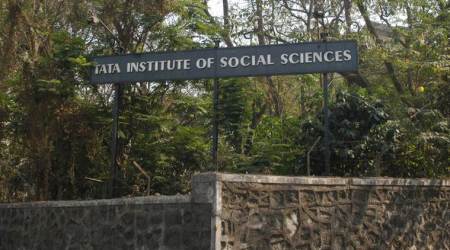 TISS has withdrawn fee exemption granted to SC/ST and OBC students entitled to the Government of India-Post Matric scholarship.
TISS has withdrawn fee exemption granted to SC/ST and OBC students entitled to the Government of India-Post Matric scholarship.
Twenty-four-year-old Rajesh pursuing his MPhil-PhD degree from Tata Institute of Social Sciences has his schedule set for most weekends. After classes on Fridays, he borrows Rs 200 from friends or faculty and travels to Valsad in neighbouring Gujarat to work as a labourer at construction sites, earning around Rs 280 per day. He returns the borrowed money on Monday and saves the rest to send to his parents and two younger siblings at the end of the month. Belonging to a tribal community based in Gujarat’s Dang district, one of the least populous but economically severely distressed, Rajesh is the first person in his village to get a post-graduation degree. With both parents being landless labourers, migrating within Gujarat and to Maharashtra for work, Rajesh fears he may have to drop out of his course.
The withdrawal of exemption from fees for SC/ST and OBC students entitled to the Government of India-Post Matric scholarship at TISS has put many students like Rajesh in a fix.
“It was only on my first day of the three-day orientation programme at the institute post admission in 2017 that we were told that the 2017-19 batch will have to pay the entire fees upfront. My parents have barely seen Rs 5,000 in their lives. How am I to pay over a lakh for the course? The only option I see now is to drop out of the course. But it would mean losing a year. With all this pressure, how does one focus on academics?” Rajesh asks.
For the past few days, students at TISS have been protesting against this withdrawal of exemption. They have shut the main gate of the institute, boycotted classes and fieldwork across its campuses in Mumbai, Hyderabad and Tuljapur demanding restoration of the financial assistance, which was being offered to SC/ST and OBC students.
Till 2014, the GOI-PMS scholarship money would come directly to the institute from the central and state governments. With a shift to Direct Benefit Transfer scheme, the amount is now given to students directly into their bank accounts at the end of two semesters for the first year and after the completion of the course for the last two semesters. TISS administration says the scholarship amount differs from state to state with some states giving an amount of only Rs 10,000 with the actual expense of the course going over a lakh. The scholarships for OBC students have already been withdrawn since 2015 with many state governments stating that the benefit cannot be given to those studying in deemed universities such as TISS.
Currently, the protesting students are demanding that the institute should grant exemption from payment of fees, like it used to, for students eligible for the GOI-PMS scholarship. A circular issued in May last year stated that the students would now have to pay fees towards their dining hall and hostel accommodation expenses to the institute. The institute says students will get reimbursed by their respective state governments as per their provisions. The institute also says it will attempt to raise money through other means, such as an aid fund, for students from marginalised backgrounds who cannot afford the fee. The students, however, feel it may not be a sustainable measure to cater to a large number of candidates seeking fee exemption.
The students say since the 2016-18 batch was informed about it only mid-term, they should be given an exemption. After talks with a delegation of the protesting students, the administration has decided to grant exemption to the students of the 2016-18 batch so that they can pay the amount subsequently. For the 2017 batch, which was informed of the change only after admission, a solution is yet to be reached out with the administration not offering the exemption so far.
“Earlier, the institute granted full exemption to SC/ST and OBC students. It could seek the additional expenses under the maintenance grant from the University Grants Commission. With transfers into students accounts directly as per the change in government rule, these expenses cannot be claimed anymore,” said an official from TISS.
The institute claims that this has led to the institute having paid a deficit of over Rs 22 crore to be paid by various state governments on scholarships alone. The students, irrespective of their financial background, have to pay the fees towards their dining hall and hostel expenses of Rs 62,000 per year upfront, which will be reimbursed subsequently by the government as per their provisions. If a state government offers less than Rs 62,000, the rest of the amount will have to be paid by the student.
Students say while the 2016-18 batch was informed about this withdrawal of exemption only mid-term, the 2017 batch, too, was not informed at the time of the admission. “We have been seeking exemption from the payment of fees for the two batches. After talks with the administration, the hostel charges are being waived while the payment for the dining hall charges has been deferred for the 2016-18 batch. No such exemption is being given to the 2017-19 batch. We are continuing with our demand and are seeking restoration of the exemption from the institute for the 2017 batch as well,” said Archana Soreng, president of the student union.
Many students and faculty say the change in rules due to the government’s policy will only make quality higher education inaccessible for those coming from marginalised communities. “If the government is not giving money to the institute, authorities at TISS should at their level pressurise the government than make the individual student, who is already marginalised, bear the brunt. It is not about one institute. If a monthly stipend can be given to IIT, IIM by the government, we are asking for the bare minimum in terms of accommodation and food,” said another MPhil-PhD student who did not wish to be named.
TISS authorities say they have raised this issue with the Ministry of Human Resource Development multiple times seeking recognition to the courses they offer as a professional degree, which would then mean an increase in the amount given in the scholarships to students.
“The course fee continues to be exempted for all SC/ST students at the institute. They have to currently pay expenses towards their hostel and dining hall. We are aware that many students are facing difficulty in this and are continuously in the process of generating resources for students from the 2017-19 batch onwards. While the 2016-18 batch has been exempted from paying hostel fees altogether and can pay the dining hall fees at a subsequent time once they get a job, we are working with the finance team to see what are the modalities and how much we can help the 2017-19 batch as well,” said P K Shahjahan, Dean, Student Affairs.
Many like Rajesh say the new rule will affect not just them but many others seeking education from TISS, even changing the institute’s demography to a large extent. “Nobody from a background similar to mine, who is in actual need for quality education, will be able to reach an institute like this,” said Rajesh. Information gathered by students through Right to Information Act states that while the institute had 28 per cent of OBC students in 2013, when they were getting scholarships, the number kept falling once the scholarship was withdrawn with a 10 per cent reduction in 2016-17. The students say this drop has not been addressed by the institute and will also show in SC/ST student population if the exemption is withdrawn.
A TISS faculty member said the changes in government policy pointed toward a shift to a neo-liberal approach making education privatised and profit-oriented making access to all difficult.
A 27-year-old student, daughter of migrant labourers, said her parents ensured she studied despite all odds. “There are students here whose parents are manual scavengers or landless labourers, who do not want their children to have the same lives of discrimination on the basis of caste, gender. If I return home without a degree, what kind of example would it set for others in my community also aspiring to get education?”
She added: “My parents could not find a home in our village because we belong to a Scheduled Caste community. While growing up, I had seen that a doctor was respected a lot. I wanted to become a doctor to earn that respect, to break from the discrimination. I could not get admission to a medical college due to the fees. During my graduation, I learnt that my name will be prefixed with a Dr if I get a PhD. This decision by the government and TISS is discarding my experiences, my struggle.”
Speaking to The Indian Express, Priyadarshini Telang of the Dalit Adivasi Adhikar Andolan said, “The scholarship funds granted by the government to SC/ST students is only one-third of the requirement. It would mean that only one-third students would get the scholarship or all students can only get exemption of one-third of their fees. In any case, it is not enough. It certainly has an impact on central universities which have high fees. Students coming from various disadvantaged backgrounds cannot afford such education.”
“TISS has centres called Centre for Inclusion, Centre for Dalit and Tribal Studies and Action and Centre for Women’s Studies. They want to study our communities, but do they not want us to study here,” asks the 27-year- old. The TISS administration held a meeting with students even on Sunday till late night on the issue.
For all the latest Mumbai News, download Indian Express App


























